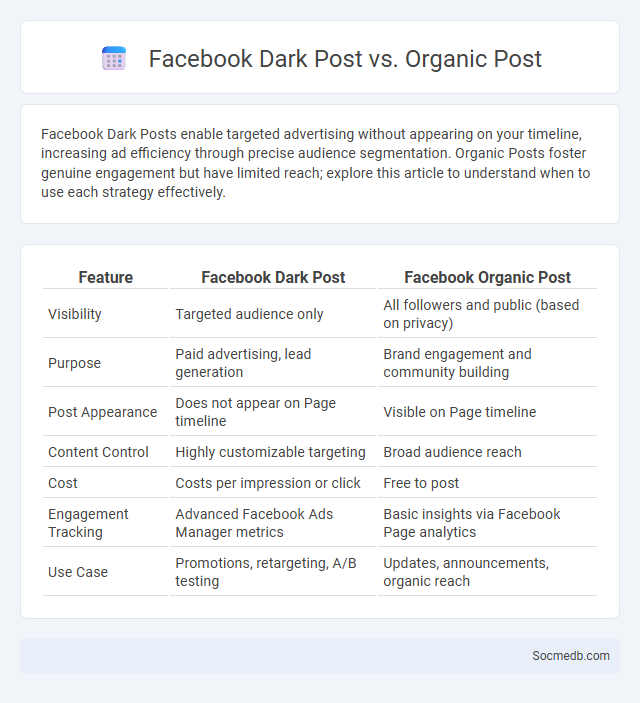
Photo illustration: Facebook Dark Post vs Organic Post
Facebook Dark Posts enable targeted advertising without appearing on your timeline, increasing ad efficiency through precise audience segmentation. Organic Posts foster genuine engagement but have limited reach; explore this article to understand when to use each strategy effectively.
Table of Comparison
| Feature | Facebook Dark Post | Facebook Organic Post |
|---|---|---|
| Visibility | Targeted audience only | All followers and public (based on privacy) |
| Purpose | Paid advertising, lead generation | Brand engagement and community building |
| Post Appearance | Does not appear on Page timeline | Visible on Page timeline |
| Content Control | Highly customizable targeting | Broad audience reach |
| Cost | Costs per impression or click | Free to post |
| Engagement Tracking | Advanced Facebook Ads Manager metrics | Basic insights via Facebook Page analytics |
| Use Case | Promotions, retargeting, A/B testing | Updates, announcements, organic reach |
Introduction to Facebook Dark Posts and Organic Posts
Facebook Dark Posts are targeted, unpublished ads that don't appear on your business's timeline but deliver tailored messages to specific audiences, boosting ad relevance and engagement. Organic posts, on the other hand, are visible on your page's timeline, designed to foster community interaction and long-term brand loyalty without paid promotion. Understanding the distinction helps you optimize your social media strategy by balancing paid reach with authentic audience connection.
What Are Facebook Dark Posts?
Facebook Dark Posts are unpublished ads that appear only in targeted users' news feeds and do not show up on your main Facebook Page timeline. These posts enable precise audience segmentation, allowing advertisers to tailor content for specific demographics without cluttering their public feed. Utilizing Facebook Dark Posts can significantly enhance campaign effectiveness by delivering personalized messages directly to your intended audience.
Understanding Organic Posts on Facebook
Organic posts on Facebook refer to content shared directly on a page or profile without paid promotion, reaching users naturally through the platform's algorithm. These posts rely on engagement factors such as likes, comments, shares, and relevance to targeted audiences, influencing their visibility in news feeds. Understanding the impact of post timing, content quality, and audience interaction is crucial for maximizing organic reach and fostering authentic community connections on Facebook.
Key Differences Between Dark Posts and Organic Posts
Dark posts on social media are unpublished ads targeted to specific audiences, allowing precise control over who sees the content without appearing on your public timeline. Organic posts are visible to all your followers and can generate authentic engagement but lack the advanced targeting options of dark posts. Understanding these distinctions helps you optimize your social media strategy by balancing broad reach with tailored advertising efforts.
Benefits of Using Facebook Dark Posts
Facebook Dark Posts offer targeted advertising by allowing marketers to create unpublished posts that reach specific audience segments without cluttering the main page. These posts enhance campaign flexibility and precision, enabling A/B testing and tailored messaging to maximize engagement and conversion rates. Utilizing dark posts improves ROI by delivering personalized content to users most likely to respond, optimizing ad spend efficiency.
Advantages of Leveraging Organic Posts
Leveraging organic posts on social media enhances authentic engagement by fostering genuine connections with Your audience without the need for paid promotions. These posts build long-term brand loyalty and trust, as they prioritize real interactions over advertisements. Consistently sharing valuable organic content improves visibility in users' feeds, driving sustainable growth and organic reach.
Comparing Reach: Dark Posts vs Organic Posts
Dark posts on social media offer targeted reach by appearing only to selected audiences, optimizing engagement through precise demographic and interest-based filters. Organic posts rely on viral sharing and follower interactions, typically achieving broader but less focused exposure. Marketers often prefer dark posts for campaigns requiring measurable ROI and specific audience segmentation, while organic posts support brand awareness and community building.
Ad Targeting: Dark Posts vs Organic Engagement
Dark posts on social media enable precise ad targeting by delivering customized content to specific audience segments without appearing on your main timeline. Organic engagement builds long-term trust and authenticity but lacks the detailed targeting and measurement capabilities of dark posts. You can maximize campaign effectiveness by combining dark posts' precision targeting with the credibility of genuine organic interactions.
Ideal Use Cases for Dark Posts and Organic Posts
Dark posts on social media are perfect for targeted advertising campaigns, enabling precise audience segmentation and personalized messaging without cluttering your main feed. Organic posts excel at building authentic engagement and cultivating community through consistent brand storytelling and interaction. Leveraging both effectively maximizes your reach by combining tailored promotion with genuine connection.
Choosing the Right Strategy for Your Facebook Marketing
Selecting the right Facebook marketing strategy hinges on understanding your target audience's demographics, interests, and online behavior to maximize engagement and conversion rates. Leveraging Facebook's diverse ad formats and advanced targeting options helps tailor your campaigns effectively, ensuring your content resonates with potential customers. You should continuously analyze campaign performance metrics like CTR, CPC, and ROI to refine your approach and achieve optimal marketing outcomes on Facebook.
 socmedb.com
socmedb.com